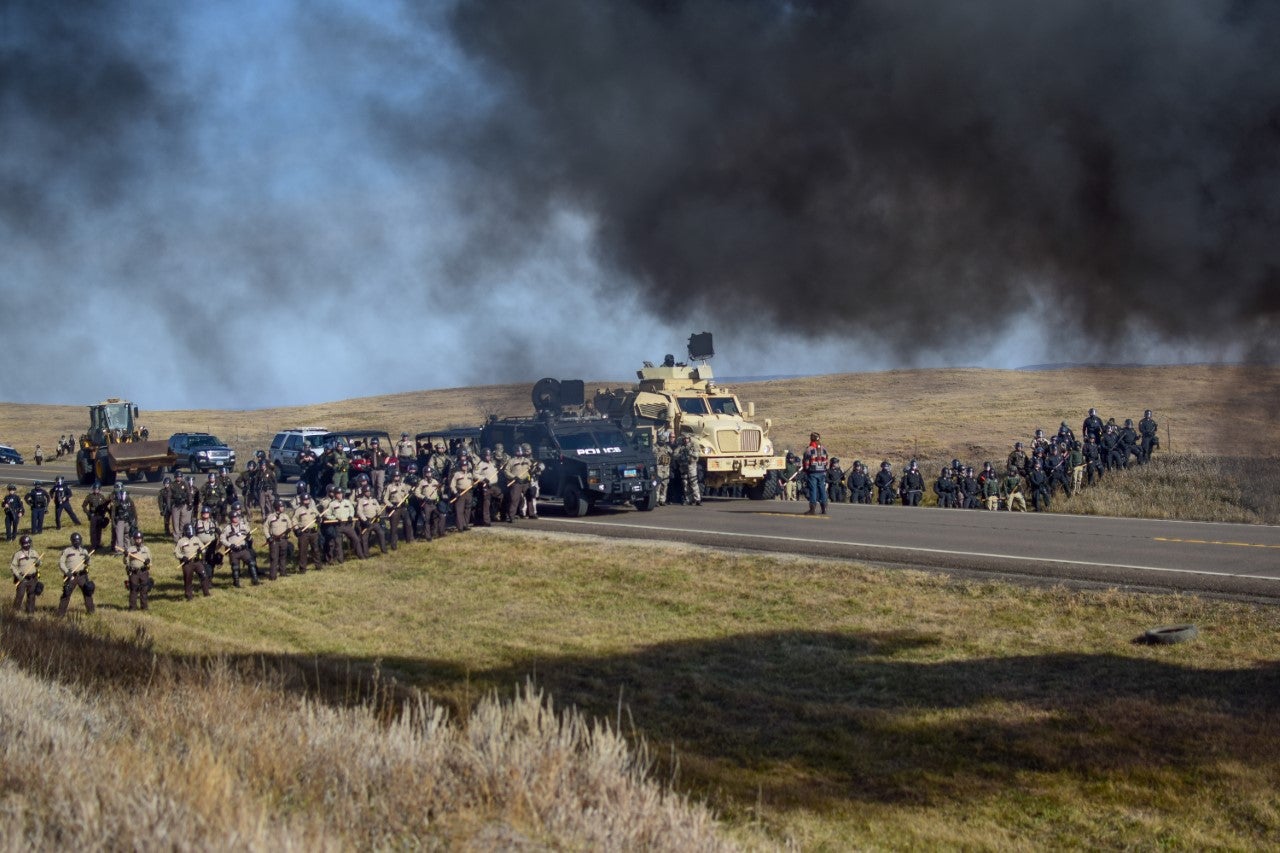My tribe holds a funeral every week for people killed by fossil fuels. This isn’t progress – it’s environmental genocide
Our wells are so polluted our tribe must now buy water. Our land is so toxic, organic food can’t be grown within 16 miles


As a member of the Ponca Nation, my family’s journey from our homelands to what would become Oklahoma took place in 1877. My grandfather was eight years old when he was walked at the point of a bayonet from South Dakota with his parents and grandparents. Hundreds of tribes were forced to walk along many “Trails of Tears” nationwide.
Millions did not survive the journey, but the devastation of spirit and culture remains part of our genetic memory. So too, does our ancestral knowledge of living in balance with the Earth and philosophy of caring for the next seven generations to come.
Fast forward to today. The “Land Back” movement is gaining mainstream recognition, and racist statues and sports team names are disappearing. Amid this progress, however, the Trump administration, state governments and the fossil fuel industry are attempting the largest Indigenous land grab since the 1830 Indian Removal Act.
On top of this, the climate clock is running out as Americans continue to reel under the continuing saga of the election and rising deaths from Covid-19. Under the cover of pandemic and anxious for a last gasp, the fossil fuel industry is striking deals for control of Indigenous lands with the outgoing Trump administration, and his GOP allies in Congress. From the Arctic refuge to the Bayou, it is nothing new to Native peoples that so much oil and gas activities are placed on or near tribal land, contaminating soil, rivers, aquifers and air while adding to the climate crisis and directly impacting community health. We are considered “sacrifice communities”.
Oklahoma has become a fossil-fuel dependent state. Today it is home to the world's largest convergence of aging oil and gas pipelines and thousands of manmade earthquakes owing to fracking. In my small Ponca tribe, we hold a funeral nearly every week from fossil fuel-related illnesses. All our families have multiple cases of asthma, cardiovascular disease and industry-specific cancers. Our wells are so polluted our tribe must now buy water. Our land is so toxic, organic food can’t be grown within 16 miles. They call it economic progress. We call it environmental genocide.
In July 2020, it seemed change was in the wind. In a landmark decision, the Supreme Court reaffirmed that much of eastern Oklahoma falls within Indian reservations. Known as the McGirt decision, it held far-reaching implications, including reaffirming tribal sovereignty over environmental lawmaking. But the undoing of such a victory was engineered 15 years ago.
Within days of the Supreme Court ruling, in consultation with the Petroleum Alliance of Oklahoma, Governor Kevin Stitt (R-OK) pulled the pin on a long-hidden environmental grenade. In 2005, Senator Inhofe (R-OK) quietly attached a “midnight rider” to an unrelated federal highway bill that gives the state and the EPA environmental authority over tribal lands. In August, the Covid pandemic had shuttered most tribal offices statewide. At this time, tribal governments were informed by mail that we had a few days to “comment” on the EPA takeover. Shortly thereafter, in violation of our right to free prior and informed consent, Trump’s EPA administrator, Andrew Wheeler, reported that tribes had been “consulted” – a far cry from consent. And just like that, the deal was done. But Governor Stitt seeks much more.
Revealed in a memo to Congress called “One Oklahoma”, Stitt is working to strip the 39 federally recognised tribes of our inherent sovereignty. This plan paves the way for further oil and gas development. It is co-signed by a number of Trump allies, notably the “Godfather of Fracking”, multibillionaire Howard Hamm of Continental Resources, one of the nation’s biggest independent oil companies. But more than that, it threatens to erase our treaty rights, our heritage and culture – and it is the blueprint for how to dismantle the rights of native peoples across the country.
The fight for Indigenous rights has never been more important for all humanity. It is no coincidence that more than 80 per cent of the world’s remaining intact forests and biodiversity is in Indigenous hands. We are global leaders of green movements, including the Rights of Nature, which provides legal standing for ecosystems in law. My own tribe, with the help of groups like Movement Rights, was the first in the US to recognise that on tribal land, nature – of which humans are a part – has the legal right to exist and regenerate its vital cycles.
In 2016 Mni Wiconi, or “Water is Life”, entered the American lexicon as hundreds of thousands joined native peoples on the Standing Rock Reservation. We came to stop the DAPL pipeline from going under the Missouri river, to protect the sacred water on behalf of six tribes and 17 million Americans downstream. Many of us faced down police water cannons in freezing temperatures; we were maced, arrested, numbered with Sharpie pens on our arms and held in dog cages. My number was 138. My son’s number was 4838. Following Standing Rock, many states passed laws making protesting fossil fuel activities felonies, including Oklahoma.
We will always put our bodies on the line to protect the source of all life, Earth, and future generations, including yours. The solutions for a green future based on living in balance with the Earth already exist, and Indigenous people hold ancestral knowledge integral to that shift. We will fight One Oklahoma in court, in Congress, signing petitions, and on the front lines. We need you to join us. After all, we are not humans protecting nature; we are nature, protecting itself.
Casey Camp Horinek is an elder and the environmental ambassador for the Ponca Nation of Oklahoma and leads Movement Rights Oklahoma and Indigenous Rights of Nature campaigns
Join our commenting forum
Join thought-provoking conversations, follow other Independent readers and see their replies
Comments



Bookmark popover
Removed from bookmarks